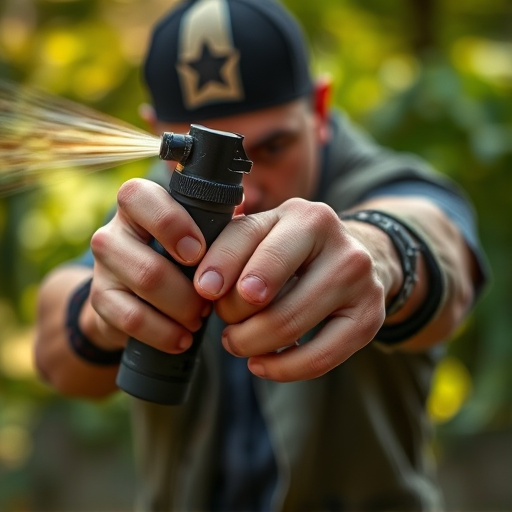Treating Pets Exposed to Pepper Spray TL;DR:
When pets are exposed to concentrated capsicum (pepper) spray, immediate action is crucial. Move them to a well-ventilated area, remove contaminated clothing, and flush the spray with water. Keep eyes clean with warm water for 15 minutes. Monitor for symptoms like panting, eye irritation, or breathing difficulties, and seek veterinary care promptly if irritation persists. Administer neutralizing agents (if available) and follow vet recommendations for tailored treatment to address discomfort and prevent long-term damage.
“In today’s world, understanding effective protection methods is paramount, especially for our furry friends. This article delves into the power of concentrated capsicum spray as a protective tool, offering insights that could save lives.
We’ll explore ‘Understanding Concentrated Capsicum Spray: A Closer Look’ to uncover its mechanism and effectiveness. Additionally, we provide essential guidelines on ‘Treating Pets After Exposure to Pepper Spray’ and share preventative measures to ensure your pets remain safe. With a focus on SEO keywords like ‘treating pets exposed to pepper spray’, this comprehensive guide equips you with the knowledge to protect your companions.”
- Understanding Concentrated Capsicum Spray: A Closer Look
- Treating Pets After Exposure to Pepper Spray
- Preventative Measures: Protecting Your Pets from Pepper Spray
Understanding Concentrated Capsicum Spray: A Closer Look
Concentrated capsicum spray, often known as pepper spray, is a powerful tool for personal protection. This chemical agent is derived from the capsicum plant and is renowned for its ability to cause temporary yet intense irritation to the eyes, nose, and respiratory system. When used correctly, it can deter potential threats, giving users precious time to escape or seek help.
For pet owners, understanding how to treat pets exposed to pepper spray is crucial. Pets, especially dogs, might inadvertently come into contact with this spray during walks or outdoor activities. Symptoms in animals can include excessive panting, tearing up of eyes, pawing at the face, and difficulty breathing. Immediate action should be taken, including moving the pet to a well-ventilated area, removing contaminated clothing, and providing water to help flush out any remaining spray. Regular veterinary check-ups are also recommended to monitor for any long-term effects.
Treating Pets After Exposure to Pepper Spray
If your pet has been exposed to concentrated capsicum spray, it’s crucial to act swiftly and provide appropriate treatment. The first step is to ensure their safety by moving them to a well-ventilated area, as the effects of pepper spray can be intense and even dangerous for animals, just as they are for humans. Remove any contaminated clothing or bedding immediately to prevent further irritation.
In terms of treating pets exposed to pepper spray, it’s important to keep their eyes clean and moist to alleviate discomfort and potential damage. Rinse their eyes gently with warm water for at least 15 minutes, ensuring the solution reaches both eyes thoroughly. If irritation persists, consult a veterinarian who may recommend further treatments or medications. Additionally, keep an eye out for respiratory distress, as pepper spray can cause coughing or difficulty breathing. In such cases, provide fresh air and seek veterinary care promptly.
Preventative Measures: Protecting Your Pets from Pepper Spray
If your pet is exposed to concentrated capsicum spray, also known as pepper spray, it’s crucial to act swiftly in treating them. The first step is to remove any remaining spray from their fur or skin by gently rinsing with water. This process helps prevent further irritation and absorption of the capsaicin, the active ingredient in pepper spray that causes the burning sensation.
For pets exposed to pepper spray, monitoring for symptoms like excessive panting, drooling, tearing up of eyes, or difficulty breathing is essential. If your pet exhibits any of these signs, it’s important to seek veterinary care immediately. Treating Pets Exposed to Pepper Spray should involve administering a neutralizing agent if available to help alleviate the effects of the capsaicin. Your veterinarian can provide guidance on appropriate treatments based on your pet’s specific condition.
Concentrated capsicum spray can be a potent tool for protection, but it’s crucial to understand its effects and take preventative measures. When pets are exposed, proper treatment is essential to mitigate discomfort and ensure their well-being. By combining education on the spray’s usage with proactive safety strategies, pet owners can better protect their furry companions from unexpected encounters with this irritant. Remember, knowledge and swift action are key when treating pets exposed to pepper spray.
